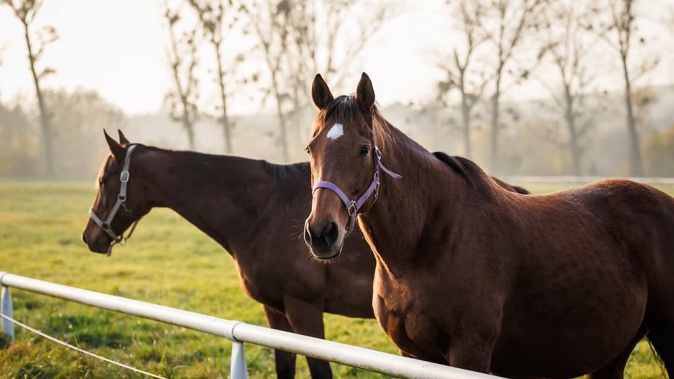

A horse that failed to fall pregnant became the centre of a dispute over who should pay for a service that yielded no foal.
The stress-prone mare was to have been inseminated by a breeding company with frozen semen from a selected stallion.
Afterwards, she was meant to have been placed in a quiet paddock environment with a companion horse to help keep her calm.
However, the insemination was unsuccessful.
As a result, the woman who was in charge of the horse, which was owned by an equine company, refused to pay the $2043 invoice for related costs and vet fees.
Now the case has ended up in the Disputes Tribunal where the breeding services company has been successful in its claim against the woman.
That’s despite the company having breached part of the contract by not putting the mare in a paddock as asked.
The tribunal said in a decision that was made in May, but only recently released, that it was not possible to make a link between the failed pregnancy and the management of the horse.
Tribunal referee Sara Grayson accepted evidence that four out of 10 frozen semen inseminations from the stallion would fail.
“It is possible that this attempt might not have been successful despite the best efforts of [the company].”
This was despite it not following instructions on putting the horse in a paddock, according to the signed contract.
The horse was delivered to the breeder in November 2022, after a contract was signed a month earlier setting out the terms for the mare’s care and management.
Grayson said it was clear that the horse was to be placed in a paddock with grass to graze on.
However, the breeding company director told the tribunal the term “grazing” meant that horses would be fed grass in a paddock or hard feed (grain) in a barn or yard, and that there was no guarantee that the horse would get her own paddock.
Grayson found it reasonable for the woman to assume that the term “grazing” meant the horse would be in a paddock eating grass, and that the company director had not made it clear on its admission form that “solo grazing” was not necessarily in a paddock.
“I am satisfied that this would be the common understanding of this term,” Grayson said.
The woman in charge of the horse, who was not named in the decision, also emailed the company to say the mare was very sensitive so a “quiet friend” would be best, otherwise she would stress.
She then arranged for that herself, and told the breeding company she would be bringing another horse with her, as company for the mare.
But, a worker removed the second horse the next day, and brought the brood mare in for her appointments for breeding services, to avoid what she said were agistment costs.
Agistment costs are fees paid to have animals cared for on someone else’s land.
The mare was put in a free stall barn. On two occasions she was put into a paddock but became stressed and was brought back into the barn, Grayson said.
She said given the clear instructions, the company breached the contract by not putting the horse in a paddock, and had failed to promptly communicate with the woman when the second horse was removed.
That meant the woman wasn’t aware of what had happened and didn’t have an opportunity to offer to pay for the agistment costs.
Grayson said she was, however, unable to find a causal link between the breach and the loss.
Therefore, the woman was liable for the $2043 in agistment costs, laboratory and veterinary fees.
Grayson was satisfied the breeding services company did its best to help the horse have its best chance to get pregnant.
“It is impossible to know why this wasn’t successful,” she said.
The tribunal said in its 2024 annual report that claims filed under $5000 still made up 56% of all claims.
Contract and consumer matters still accounted for most of the tribunal’s work, but contract disputes had increased 33%.
The total amount of the 13,550 claims lodged in 2024 reached just over $116.1 million.
Five years ago, 10,638 claims came to a total of $78.4 million.
Tracy Neal is a Nelson-based Open Justice reporter at NZME. She was previously RNZ’s regional reporter in Nelson-Marlborough and has covered general news, including court and local government for the Nelson Mail.

Take your Radio, Podcasts and Music with you









